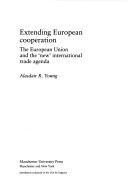European Politics
1 total work
Understanding the reasons for international cooperation is one of the central factors in studying international relations theory. This book addresses a main part of this issue - what is the impact of prior cooperation on decisions to extend cooperation to new areas of policy? This aspect of international cooperation is becoming increasingly pertinent as regional, plurilateral and multilateral agreements proliferate. The key issue is that the EU's member governments have repeatedly sought to cooperate in such negotiations, despite significant differences in their economic interests and without having previously committed themselves to cooperate. This book addresses a significant gap in the literature on EU policymaking, namely, analysis of foreign economic policy-making. It is also directly relevant to understanding how the EU engages in international trade negotiations, including those currently underway and in prospect within the World Trade Organization. Three illuminating case studies are used to illustrate the points made - the basic telecommunications services negotiations, the EU and the MAI (Multilateral Agreement on Investment) and transatlantic aviation.
